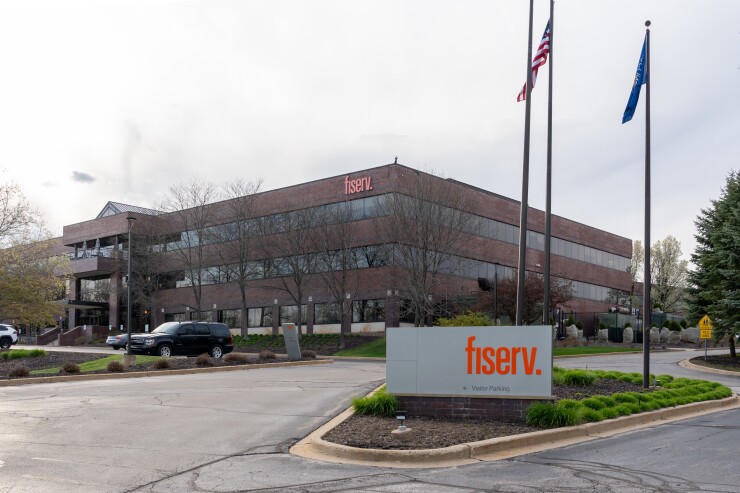- What's at stake: The deal could strengthen Fiserv's competitive advantage by bundling deposit services with its core processing, payments and new digital asset offerings.
- Supporting data: StoneCastle allows banks and credit unions to offer customers up to $100 million in federal insurance on deposits.
- Forward look: U.S. lawmakers are advancing bills that would ease rules on reciprocal deposits, which could benefit networks like the one Fiserv is acquiring.
Overview bullets generated by AI with editorial review
Fiserv, the banking core software provider, has signed an agreement to acquire deposit network StoneCastle, enabling banks on the Fiserv network to take custody of billions in deposits made by large depositors.
Fiserv expects the transaction to close by the first quarter of 2026, subject to regulatory approvals. The company did not disclose the financial terms of the agreement.
The move is designed to allow Fiserv to serve institutional depositors with insurance on deposits that exceed the federal limit of $250,000 and to allow banks on the Fiserv network access to custody parts of these large deposits.
These insured deposit products would, if regulators approve the acquisition, be offered directly alongside Fiserv's existing core account processing, digital banking, payments and cash-management offerings.
What is StoneCastle?
StoneCastle, founded in 2009, operates a deposit network in the U.S. that large corporations, endowments, universities and other institutions can use to insure large deposits.
It lets banks and credit unions offer customers and members up to $100 million in federal insurance, allowing these financial institutions to better maintain relationships with large depositors.
StoneCastle also offers enterprise solutions to allow the likes of wealth managers and non-bank lenders (particularly those looking to require and benefit from compensating deposit balances) to insure deposits as large as $100 million.
And, for banks with excess deposits, the company provides an outlet to avoid capital charges.
On the other side of the ledger, StoneCastle gives its bank customers access to custody of these deposits. The company says the depositors are "trustworthy institutions" and that the deposits are "low-cost" and "stable," according to
StoneCastle has existing relationships with over 300 Fiserv core banks as part of its deposit network, according to the Fiserv announcement.
Brokered deposit rules evolve
Fiserv's move to integrate a deposit network into its platform comes as U.S. lawmakers
In mid-September 2025, the House Financial Services Committee (HFSC) nearly unanimously approved bills that would increase the amount of custodial deposits a bank can hold without being subject to the relatively strict rules governing so-called brokered deposits.
Brokered deposits — those collected by a third party and placed in a bank as a single block — often draw heightened scrutiny from regulators because they are considered "hot money" — deposits that hop around to whichever bank is currently offering the best interest rates.
Because of this tendency to move from bank to bank, regulators demand higher deposit insurance premiums on brokered deposits.
There is a related type of custodial deposit that lawmakers argue deserve looser treatment than brokered deposits. These so-called reciprocal deposits are deposits that banks exchange with each other to offer increased deposit insurance.
Lawmakers — both Republicans and Democrats — believe that reciprocal deposits do not behave the same way as brokered deposits because they do not move around so haphazardly.
The HFSC bills would increase the number of reciprocal deposits that banks can accept without being subject to the brokered deposit rules.
Lawmakers see this as a necessary change following the Silicon Valley Bank crisis in 2023, after which banks have increasingly utilized reciprocal deposits to insure larger deposits.
Connecting deposit funding to digital assets
The StoneCastle acquisition also comes as Fiserv begins a foray into digital assets, including its newly announced FIUSD stablecoin.
In June 2025, Fiserv announced plans to launch a new digital asset platform and the FIUSD stablecoin, which the company intends to add to its existing banking and payments infrastructure by the end of the year.
Fiserv designed FIUSD as a "financial institution-friendly coin that simplifies stablecoin access through a secure and scalable ecosystem," according to Sunil Sachdev, head of embedded finance at Fiserv.
Fiserv said in the StoneCastle acquisition announcement that it plans to use the deposit network network to help financial institutions retain funds associated with FIUSD stablecoin issuance.
StoneCastle will also help merchants, financial institutions and fintechs better manage the cash reserves backing the FIUSD stablecoin.
"We believe [acquiring StoneCastle] further sets Fiserv apart in core banking by enabling institutions to custody cash supporting FIUSD stablecoins, while unlocking new value and accelerating innovation across the financial ecosystem," said Takis Georgakopoulos, COO at Fiserv.






